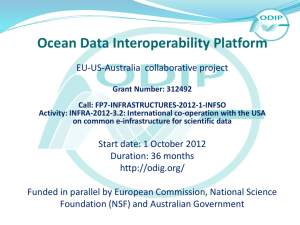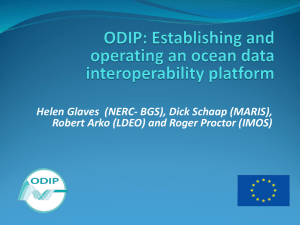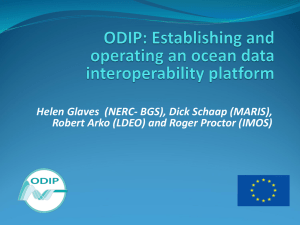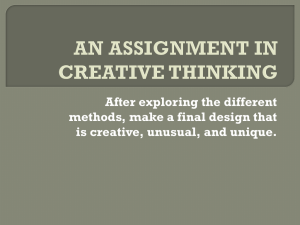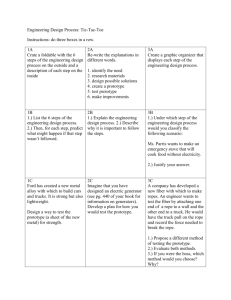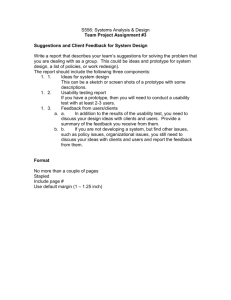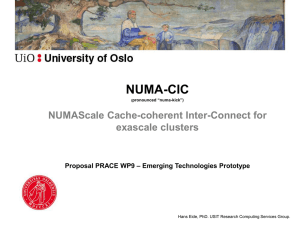Coriolis data center
advertisement
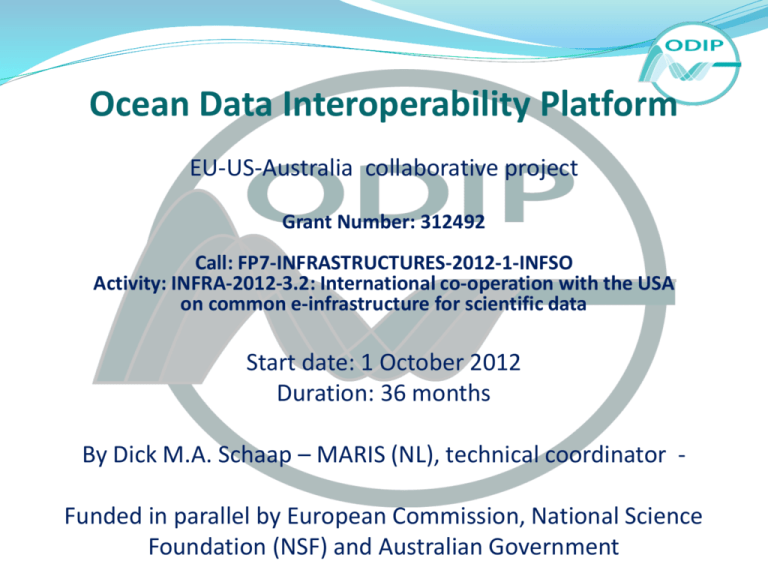
Ocean Data Interoperability Platform EU-US-Australia collaborative project Grant Number: 312492 Call: FP7-INFRASTRUCTURES-2012-1-INFSO Activity: INFRA-2012-3.2: International co-operation with the USA on common e-infrastructure for scientific data Start date: 1 October 2012 Duration: 36 months By Dick M.A. Schaap – MARIS (NL), technical coordinator Funded in parallel by European Commission, National Science Foundation (NSF) and Australian Government E-infrastructures A number of regional initiatives have made significant progress in addressing discovery, access, and long term stewardship of ocean and marine data on a regional basis Australia Europe ODIP is a community lead initiative to overcome barriers by exploring common standards and interoperability solutions for improving exchange between regional infrastructures and towards global infrastructures such as GEOSS, IODE – ODP, POGO, .. USA ODIP partners Europe: 10 EU funded partners: 6 countries NERC-BGS/BODC, MARIS, OGS, IFREMER, HCMR, ENEA, ULG, CNR, RBINS-MUMM, TNO USA: NSF funded partners (supplement to existing R2R project) San Diego Supercomputer Center (SDSC) Scripps Institution of Oceanography (SIO) Woods Hole Oceanographic Institute (WHOI) Lamont-Doherty Earth Observatory (LDEO) Florida State University: Center for Ocean-Atmospheric Prediction Studies (FSU) Australia University of Tasmania (IMOS) International UNESCO IOC-IODE Associate partners Europe Alfred Wegener Institute for Polar Research (AWI) MARUM USA NOAA US-IOOS, NOAA US-NODC, NOAA NGDC UNIDATA Australia Australian National Data Service (ANDS) Geoscience Australia (GA) CSIRO ODIP: Objectives To establish an EU/USA/Australia/IOC-IODE co-ordination platform to facilitate the interoperability of ocean and marine data management infrastructures To demonstrate this co-ordination through the development of several joint prototype projects that allow effective sharing of marine and ocean data To develop these prototype projects by largely leveraging on existing and ongoing regional projects and initiatives To promote and disseminate ODIP approach and results widely for further uptake and feedback Progress to date………. 1st ODIP workshop: Ostende, Belgium (February 2013) Addressed 6 discussion topics Formulated into an extensive list of actions Resulted into definition of 3 prototype projects 2nd ODIP workshop: San Diego, USA (December 2013) Addressed implementation plans for the 3 prototype projects and 2 additional topics (vocabularies and data publishing – citation (incl DOI) 3rd ODIP workshop: Townsville, Australia (August 2014) Addressed progress of 3 prototype projects and actions for vocabularies, data publishing – citation and person identifiers ODIP 1 prototype: Establishing interoperability between the SeaDataNet, IMOS and US NODC data discovery and access services using the GEO-DAB brokerage service and towards interacting with interacting with the IODE-ODP and GEOSS portals Lead by European partners via SeaDataNet Exchange from SeaDataNet to ODP and GEOSS is now operational at metadata level; IMOS and US NODC will follow soon pan-European infrastructure October 2014: 103 data centres connected and 4 data Centres in test for moving into operation soon => 107 data Centres from 34 countries; ODIP 1 prototype: Aggregation of SeaDataNet metadata CDI granules to CDI collections (ISO 19115 – 19139), conversion to Common Brokerage Model, and harvesting via CS-W and OAI-PMH services ODIP 1 prototype: ODIP 2 proposal submitted to add data brokerage, and semantic interoperability ODIP 2 prototype: ODIP 2: Establishing interoperability between cruise summary reporting systems in Europe, the USA and Australia and also towards global POGO portal Lead by Rolling Deck to Repository (R2R) partners (USA) SeaDataNet Cruise Summary Report (CSR) adopted with ISO19115 – 19139 Schema and supporting Common Vocabularies ODIP 2 prototype approach: Publish ISO Cruise Summary Reports at regional nodes: Marine National Facility (Australia) SeaDataNet (Europe) R2R (USA) Deploy GeoNetwork catalogues at regional nodes providing both a GUI (web portal) and API (CSW service) Harvest GeoNetwork nodes into POGO global catalogue ODIP 2 prototype progress: GeoNetWork software has been adapted by SeaDataNet for handling SeaDataNet CSR and supporting common vocabularies R2R (USA) has deployed the SDN GeoNetWork tool and makes great progress with the GUI and mapping of vocabularies for R2R US cruises and also for populating EDMO directory ( >150 US organisations added) MNF (Australia) has also deployed GeoNetWork and started with populating EDMO directory and mapping vocabularies ODIP 2 prototype new developments: CSR Schema extension with new vocabulary for specific instruments Embed in CSRs Linked Data URIs Make CSRs available as RDF for semantic web applications Interoperate with NSF EarthCube and NOAA Data Centers Establish Cruise-ID governance because of potential overlap in case of international cruises ODIP 3 prototype: Establishment of a prototype for a Sensor Observation Service (SOS) and SensorML and O&M profiles for selected sensors installed on research vessels and in real-time monitoring systems (Sensor Web Enablement (SWE)) Lead by AODN (Australia) Bundling of multiple regional initiatives and best practices towards the adoption of SWE to formulate and evaluate common standards, incl involvement of 52 North ODIP 3 prototype approach: establish a collaboration tool (Github): compile inventory of SOS services and their endpoints compile inventory of instrument SensorML records & O&M structures compile inventory of vocab and registry services working groups to assess SOS performance propose templates for SensorML/StarFl and O&M profiles examine vocabulary services and potential mappings Set-up a test bed ODIP 3 prototype progress: collaboration at https://github.com/aodn/ODIP inventory includes: Ritmare starter kit (IT), SOS Coriolis – EuroARGO (FR), Oceanotron interaction (FR), Eurofleets SWE version 2.0 (ES), ncSOS for gliders (UK), IOOS SOS (USA), IMOS (Australia), 2 SOS installations (Australia), SMG and sensorCloud (Australia) Analysis: => must adopt SWE Version 2.0 to stay aligned 52 North SOS still on V1.0 but will upgrade SensorML profiles EU and Australia quite similar in approach Testbed is being deployed for further testing of different SOS services Dialogue with manufacturers planned Dissemination of ODIP outcomes Project website Social media International conferences Other related initiatives Ocean Data Portal (ODP) Research Data Alliance Belmont Forum www.odip.org Thank you!
